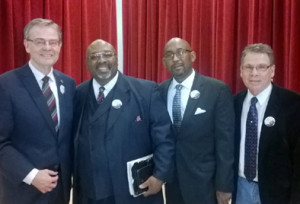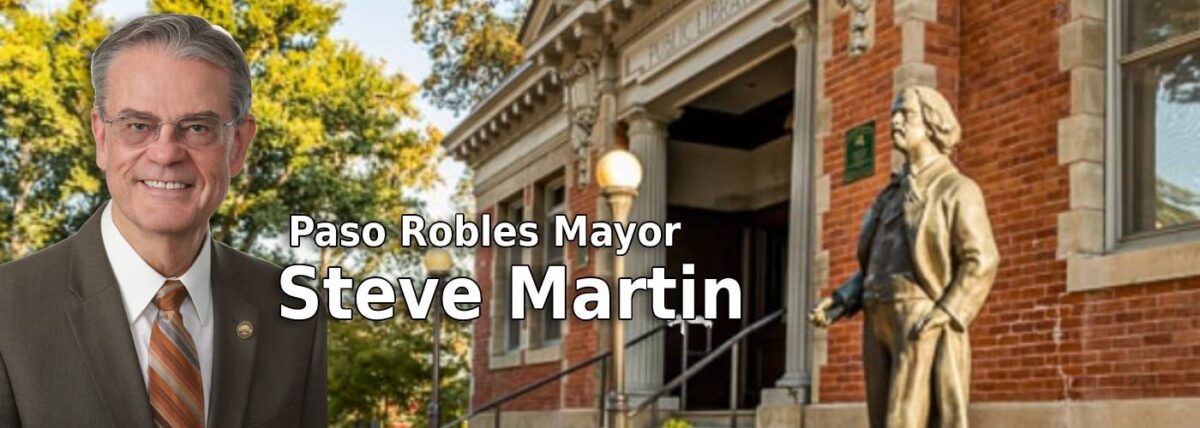[On Saturday, January 17, 2015, Mayor Steven W. Martin welcomed visitors to the George Flamson Middle School for the ceremony in remembrance and celebration of Dr. Martin Luther King Jr.]

Good afternoon,
It is an honor to be here on behalf of the Paso Robles City Council to welcome you to this remembrance and celebration of the life and message of Dr. Martin Luther King Jr.
As a child of the 60s, I possess in my memory the tenor of those times; television images of war and protest and the birthing of a new culture in America. Among the strongest of those images are those associated with the struggle for civil rights across this nation.
It must be difficult for the young people of this generation to comprehend a world without instant communication, without Facebook, Twitter, without the Internet. It must unbelievable that there was a time when everyone didn’t know everything, all the time, as it happens.
Can you imagine what the 1960s would have been like with this kind of communication? Even without it, there was so much happening that life seemed to blur from one astounding, disturbing story to the next. It was a time demanding communication in an age where we depended upon a few minutes on the radio or TV, or a story in the newspaper to tell the story of a country struggling, sometimes violently, to discard old paradigms while searching for new ones.
In this sea of jumbled and fragmented voices, however, there were a few that broke through. There were a few that were so clear and so powerful that the mere echoes of their words persisted, outlasting news cycles, rewriting on-the-fly the commentaries of the day.
The voice of Dr. Martin Luther King Jr. was one of those.
Recently I mentioned to my wife that I wished I had been able to see Dr. King in person. She said she had. It was May 12, 1967, Marathon County Fairgrounds in Wausau, Wisconsin. In her senior year of high school she had been selected as one of a few students to attend his presentation; one that had outgrown its original venue and had been moved to accommodate the audience.
Of course, we went directly to the Internet to see what existed of that speech. It was well-documented. Even audio excerpts of that day could be downloaded, along with photos of the event. We poured over the pictures and she pointed to the place in the crowd where she had sat. I swore I recognized her face.
I downloaded the excerpts from Dr. King’s speech that day and had the eerie experience of listening to it, hearing it as he had presented it with my future wife in the audience more than 47 years ago.
As I listened, I heard Dr. King say many things. Of course, he pleaded the cause of civil rights, advocating non-violent protest. “Rioting,” he said, “is the language of the unheard,” and he went on to wonder what America was failing to hear in 1967. He questioned the priorities of the people, saying if we could spend billions to put a man’s feet on the moon (something that would not happen until 1969), certainly we could spend billions to put God’s children on their feet.
I wonder today, as we gather to honor Dr. King, what we are failing to hear?
I wonder about the blessing of living on the Central California Coast, where we spend millions on tourism and wine and entertainment, and yet we still have people knocked off their feet, residing in our riverbeds and under our overpasses. I wonder about local economies that don’t produce the kind of jobs for our people that will not only keep poverty at bay but make our quality of life accessible to everyone. I wonder if we work hard enough to create a city and a region that is home to community for all.
I wonder what we are not hearing. And I wonder if we do not hear all of this because we are not listening, or if we truly have become deaf. I pray that it is the former and not the latter, because we can learn to listen. And, in listening, we can learn how to educate, how to empower and how to strengthen our community. We can ask that most urgent question: What we doing for others?
I look at the pictures of Dr. King’s speech in Wausau all those years ago and I envy those who were present. I imagine myself seated there, perhaps just a few feet from my future wife.
When I asked her to tell me what it was like she said “I don’t remember his exact words, but I knew, I just knew, he was admirable.”
Perhaps, if he were here today, that is what Dr. King would say to us.
Be admirable.
When it comes to community and respecting each other, be admirable. When it comes to feeding and housing each other, be admirable. When it comes to listening to each other, be admirable.
Perhaps that is how we reach Dr. King’s dream; a dream of a community where all the people, of all ages and backgrounds, come together.
And, when we do that, let’s put that on Facebook. Let’s Tweet about that. Let’s tell the world about it.
That, too, would be admirable.
That, I believe, would make Dr. King smile.
Thank you. Again, it is an honor to be here today and welcome you to these ceremonies. Please enjoy the presentation.
